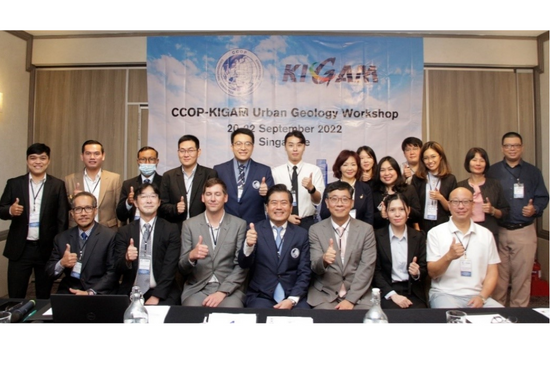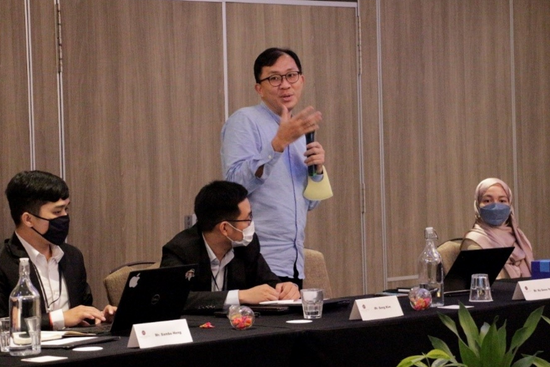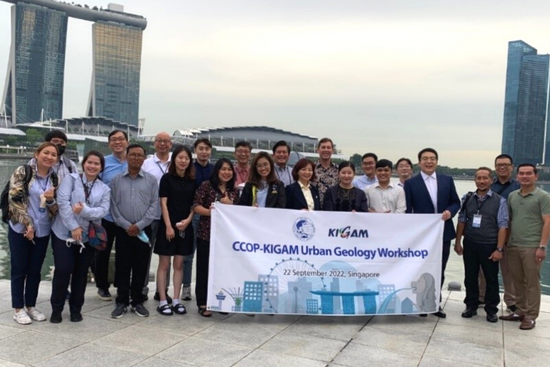 The CCOP-KIGAM Urban Geology Workshop 2022 speakers and participants at the Grand Mercure Roxy Hotel, Singapore.
The CCOP-KIGAM Urban Geology Workshop 2022 speakers and participants at the Grand Mercure Roxy Hotel, Singapore.
In September, the KIGAM Urban Geology Workshop 2022 titled “Urban Geology Technology Sharing for Sustainable Cities in East and Southeast Asia” was jointly organised by the Coordinating Committee for Geoscience Programmes (CCOP) in East and Southeast Asia, Korea Institute for Geoscience and Mineral Resource (KIGAM), and Dr Sheila Maria Arcuino Conejos, SUSS Head of Facilities and Events Management, Master of Built Environment Programmes. This is the first time that the workshop was conducted in Singapore via a hybrid mode with several participants presenting and taking part online.
The three-day workshop hosted 27 participants from 12 member countries. Dr Dong Woo Ryu, Project Manager of KIGAM Urban Geology and Dr Young Joo Lee, Director of CCOP Technical Secretariat, delivered the opening addresses to participants from Cambodia, China, Indonesia, Japan, South Korea, Lao People's Democratic Republic, Malaysia, Mongolia, Myanmar, Philippines, Singapore, Thailand, United Kingdom and Vietnam.
The first two days of the workshop highlighted four keynote presentations wherein the representatives from CCOP member countries shared updates about the status of urban geology in each country. The group discussions led by Dr Wook Hyun Nahm, Principal Researcher, KIGAM and Marcus R. Dobbs, Head of Engineering Geology, British Geological Survey, were centred around the following potential subjects for future collaboration:
- Specific cases of the complex geological disasters that occurred in their countries,
- Government efforts
- Cases related to climate change in which the frequency and extent of damage have increased in the urban area and countermeasures at the government level

Mr Ku Swee Yong, SUSS PhD candidate and supervisee of Dr Conejos, sharing to the group about his research undertakings with the Sustainable Built Environment Lab.
The final day of the workshop was a full day of experiential learning. Participants visited the Singapore City Gallery at the Urban Redevelopment Authority and the Marina Barrage Sustainable Gallery, followed by a multi-ethnic cultural tour to Little India, Malay Village and Chinatown to learn more about Singapore’s diverse melting pot of cultures and races.

Group photo of workshop participants at The Esplanade.
As one of the Heads of the Built Environment programmes in SUSS, Dr Sheila Maria Arcuino Conejos co-organised this workshop to highlight the significance between built environment and urban geology. Urban geology plays a key role in future urban planning and creating resilient cities to limit conflicts, reduce risks, and lower the costs of subsurface challenges, thereby helping cities tackle issues and achieve a climate-neutral future.
Urban resilience is a concern for all nations due to climate change challenges and we need to develop transdisciplinary future graduates who will aid in the futureproofing of cities in terms of promoting safe construction and maintaining critical infrastructure (e.g. transport tunnels, supply networks and foundations). Active involvement in UN supported events for international cooperation, research collaboration and internships will open doors of opportunities to SUSS students, graduates and academics.
The Coordinating Committee for Geoscience Programmes (CCOP) in East and Southeast Asia is a unique intergovernmental organisation in the region dealing with all geoscientific issues of the region by international partnership. CCOP was established in 1966 within UN-ECAFE (now UN-ESCAP) and became an intergovernmental organisation in 1987. Currently, CCOP comprises of 16 member countries, 14 cooperating countries and 17 cooperating organisations throughout the world. For more than 55 years, CCOP has provided a strong foundation of bi-lateral and multi-lateral cooperation for its member countries, the cooperating countries and organisations.